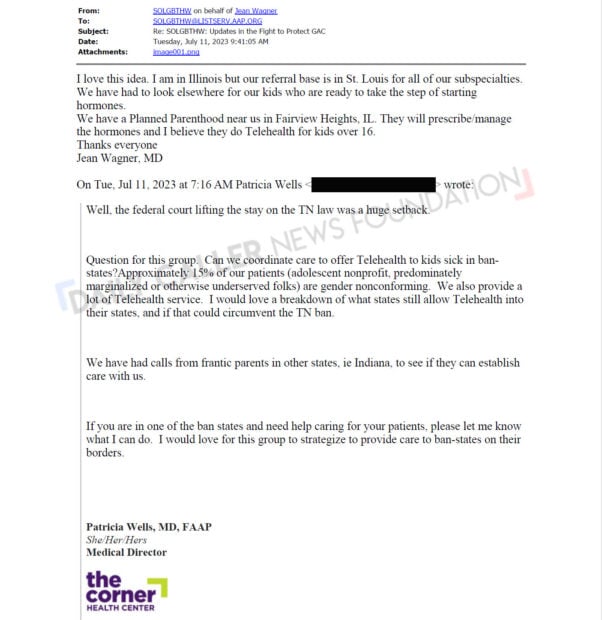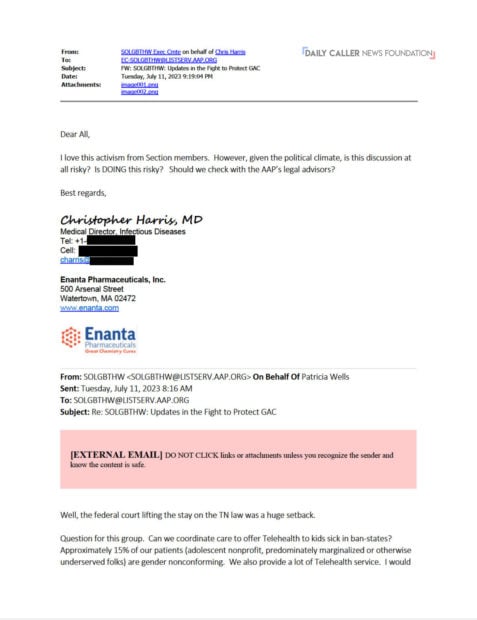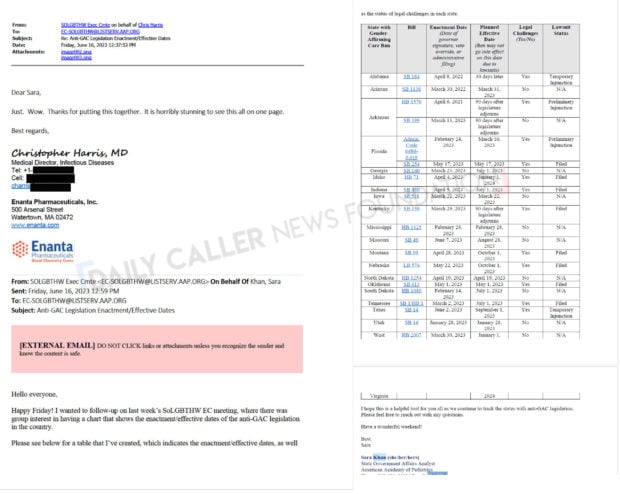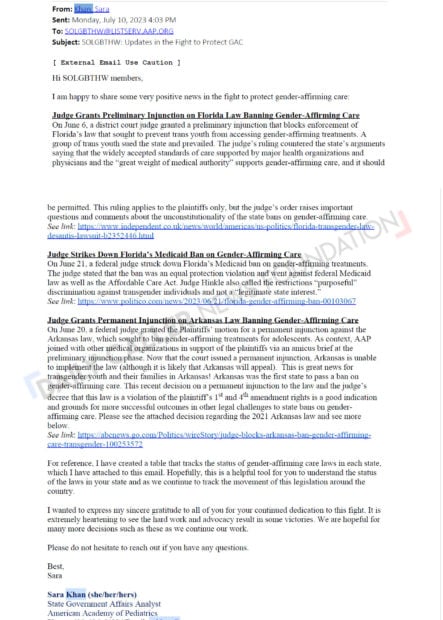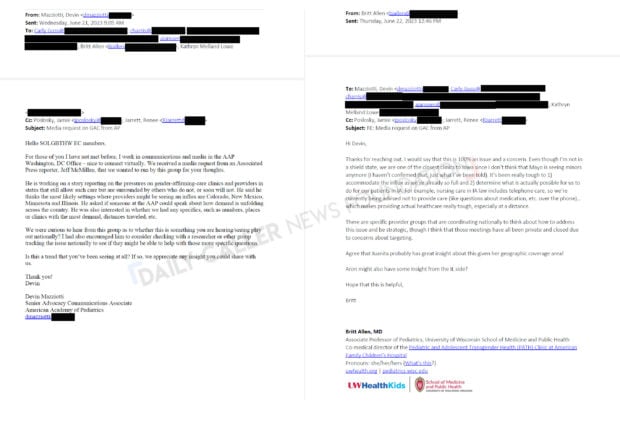The emails are part of a trove of documents that show how the American Academy of Pediatrics (AAP), the country’s largest professional association of pediatricians with a membership of 67,000 doctors, quietly partnered with transgender activist groups, such as the Human Rights Campaign and the World Professional Association of Transgender Health (WPATH), to push child sex changes nationwide.
Internal AAP communications from July 2023 show members strategizing ways to provide sex change interventions to children living in states that have banned the procedures, including using telehealth to access hormones from out of state providers. Currently, 25 states have passed legislation banning or restricting pediatric sex change.
Through a public records request, the DCNF obtained the internal communications from members of the AAP’s Section on Lesbian, Gay, Bisexual, and Transgender Health and Wellness (SOLGBTHW), a group within the AAP that provides the organization with expertise and education on LGBT issues.
The AAP has multiple subgroups or “sections” within the organization that focus on different specialty areas of medicine to connect “like-minded professionals who share a pediatric subspecialty, surgical specialty, special area of interest, or stage of life.” The section on LGBT health requires an additional fee for AAP members to join. Health professionals who are not pediatricians, such as registered nurses, psychologists, and social workers, are also able to join the group as a section affiliate.
FOIA documents discussing pediatric sex change.
In a July 2023 email thread Dr. Patricia Wells, an AAP Fellow and part of the LGBT health section email group, drew attention to a federal court ruling that allowed Tennessee’s ban on child sex changes to take effect, calling it a “huge setback.” Wells requested help from her colleagues to “circumvent” the Tennessee ban, suggesting telehealth as a possible option to deliver medical interventions to minors.
“Question for this group: Can we coordinate care to offer Telehealth to kids sick in ban-states?” Wells wrote. “I would love a breakdown of what states still allow Telehealth into their states, and if that could circumvent the [Tennessee] ban.”
“We have had calls from frantic parents in other states, ie Indiana [sic], to see if they can establish care with us,” Wells wrote to the group. “If you are in one of the ban states and need help caring for you patients, please let me know what I can do. I would love for this group to strategize to provide care to ban-states on their borders.”
It’s unclear if any action was taken to circumvent Tennessee or other red state’s bans on child sex changes. Wells did not respond to the DCNF’s requests for comment.
Tennessee State Senate Majority Leader Jack Johnson, who sponsored the legislation that banned pediatric sex changes, told the DCNF the law specifically prohibits using telehealth to provide minors with sex change medical interventions.
“Our law clearly states that prescribing medications or procedures for the purpose of treating gender dysphoria in minor children is prohibited, including via telehealth. Any doctor attempting to use general telehealth services to circumvent this law is violating the legislature’s clear intent,” Johnson said in a statement.
The Supreme Court recently announced it will hear a case challenging Tennessee’s child sex change ban. The AAP, with the support of WPATH submitted an amicus brief in December 2023 in support of overturning the state’s child sex change ban. For years, AAP has quietly partnered with WPATH to fight back against child sex change bans, the DCNF reported.
“I am extremely proud of the work we have done to protect children from the long-term, irreversible and damaging effects of these medical practices. I am grateful the Supreme Court will be taking up our law soon and remain hopeful they will provide further and unequivocal legal clarity to the situation,” Johnson said.
‘We Have A Planned Parenthood’
Dr. Jean Wagner, an AAP Fellow and member of the LGBT health section, responded to Wells’ email hours later, noting that Planned Parenthood of Illinois might be able to “prescribe/manage” cross-sex hormones for kids via telehealth.
“We have had to look elsewhere for our kids who are ready to take the step of starting hormones,” Wagner wrote. “We have a Planned Parenthood near us in Fairview Heights, IL. They will prescribe/manage the hormones and I believe they do Telehealth for kids over 16.”
Transgender hormone therapy is available at Planned Parenthood Illinois via telehealth for individuals 16 and over, per their website, which states their “doors are open to everyone – regardless of your zip code.”
Planned Parenthood Illinois has experienced explosive growth in their transgender services category, increasing from 3,299 transgender visits in 2020 to 6842 visits in 2022, according to their annual reports. The group’s 2022 report said cross sex hormone therapy was “growing faster than any other service.” Planned Parenthood of Illinois received nearly $150,000 in state insurance payments for transgender services in 2022, records obtained by the DCNF via a public records requests show.
Neither Wagner nor Planned Parenthood Illinois responded to the DCNF’s requests for comment.
FOIA documents discussing pediatric sex change bans.
‘I Love This Activism From Section Members’
Dr. Christopher Harris, who served as AAP’s LGBT health and wellness chair in 2021, chimed in on the July 2023 email thread, cautioning the group against taking any actions before consulting AAP’s legal advisors.
“Hi All, I love this activism from Section members,” Harris wrote. “However, given the political climate, is this discussion at all risky? Is DOING this risky? Should we check with AAP’s legal advisors?”
In a separate email thread, AAP State Government Affairs Analyst Sarah Khan sent the LGBT health section a list of states where child sex changes were banned. Khan’s June 2023 email to the section’s executive committee included a chart listing the effective dates of various state bans and the status legal challenges to them.
“I wanted to follow-up on last week’s SOLGBTHW EC meeting where there was group interest in having a chart that shows the enactment/effective dates of the anti-GAG legislation in the country,” Khan wrote. “I hope this is a helpful tool for you all as we continue to track the states with anti-GAC legislation.”
Neither Khan nor Harris responded to the DCNF’s request for comment.
A chart of pediatric sex change bans created by the AAP.
‘Ideological Gender Beliefs’
Khan sent another email in July 2023 with the subject line “Fight to Protect GAC,” where she reported the “very positive news” of judicial rulings that impeded the implementation of child sex change bans. Khan thanked the AAP section members for their “continued dedication to this fight.”
GAC refers to “gender-affirming care,” a euphemism often used by activists and doctors to describe experimental treatments such as puberty blockers, cross sex hormones and sex change surgeries.
“I wanted to express my sincere gratitude to all of you for your continued dedication to this fight. It is extremely heartening to see the hard work and advocacy result in some victories. We are hopeful for many more decisions such as these as we continue our work,” Khan wrote.
Public record email from AAP discussing pediatric sex change.
‘Highly Influential’
The AAP’s LGBT health section is credited with authoring the organization’s controversial transgender policy, which supports the use of puberty blockers, cross-sex hormones and sex-change surgeries for minors. Reaffirmed in 2023, the AAP’s transgender policy notably excludes age minimums for drug or surgical interventions. Indeed, recently-unsealed court documents suggest AAP pressured WPATH to exclude age minimums on sex changes in its clinical guidance, The New York Times reported.
The Cass Review, an independent report which reviewed the evidence supporting pediatric sex change, found that the WPATH Standards of Care underpinned almost all other guidelines in the field of transgender medicine despite their lack of “rigour.”
“[WPATH] has been highly influential in directing international practice, although its guidelines were found by the University of York appraisal process to lack developmental rigour,” the Cass Review found. “Early versions of two international guidelines… influenced nearly all the other guidelines.”
Several European countries have discontinued child sex changes in the wake of the Cass Review, but neither AAP nor WPATH have retracted their support of such procedures.
Moreover, a lawsuit filed by detransitioner Isabelle M. Ayala against the AAP questions the credibility of their transgender policy, specifically mentioning the role of the Section on LGBT Health and Wellness in the policy’s development, stating “ideological beliefs related to gender identity and gender theory” were core to the groups inception.
“A small number of individuals in positions of power within the AAP who were deeply bought into certain political and ideological beliefs related to gender identity and gender theory, saw a void of guidance for primary care physicians,” the lawsuit reads. “Upon information and belief, in 2016 those individuals formed a committee within the AAP—the “LGBT Health & Wellness” (the “Committee”)—to seize on an opportunity to lead out on this issue, be the first to offer what they saw as authoritative guidance, and ensure that that guidance aligned with their ideological gender beliefs.”
“Upon information and belief, the Committee quickly set about on a roughly two-year process to create a new ‘Policy Statement’ to be published by the AAP based on those individuals’ ideological views and introducing a radical new model for transgender and ‘gender diverse children and adolescents,” the lawsuit reads.
‘100% An Issue’
Dr. Brittany Allen, a named defendant in the Ayala lawsuit, is an executive committee member of AAP’s LGBT health section co-author of the AAP’s transgender policy. Allen is also the medical director of a pediatric transgender clinic in Wisconsin, which borders Iowa where child sex changes were banned in 2023.
On June 21, 2023, AAP leadership asked Allen if state pediatric sex change bans were causing an influx of patients in non-ban states, such as Wisconsin, emails obtained by the DCNF show. The next day, Allen responded this was “100% an issue and a concern” and wrote she’d been advised not to provide medical interventions remotely in Iowa as telehealth options were limited by state law.
FOIA emails discussing pediatric sex change bans.
“I would say that this is 100% an issue and a concern. Even though I’m not in a shield state, we are one of the closest clinics to Iowa,” wrote Allen, who did not respond to the DCNF’s requests for comment.
“Nursing care in [Iowa] law includes telephone care, so we’re currently being advised not to provide care (like questions about medication, etc. over the phone)… which makes providing actual healthcare really tough, especially at a distance,” wrote Allen.
Allen didn’t respond to multiple requests for comment.
All content created by the Daily Caller News Foundation, an independent and nonpartisan newswire service, is available without charge to any legitimate news publisher that can provide a large audience. All republished articles must include our logo, our reporter’s byline and their DCNF affiliation. For any questions about our guidelines or partnering with us, please contact [email protected].
]]>The Right To Read Act was reintroduced by Democratic Arizona Rep. Raúl Grijalva and Democratic Rhode Island Sen. Jack Reed in April 2023, and is intended to rebuff efforts by parents and Republican lawmakers to remove sexually explicit content from school libraries, according to a press release from the lawmakers. The bill also authorized $500 million in funding for school libraries and provides liability protections to school librarians and educators providing sexually explicit books to students.
A February 2023 letter signed by the American Association of School Librarians (AASL) Board of Directors outlines Sen. Jack Reed’s involvement with the National Educational Association (NEA) in crafting the Right To Read Act, suggesting Sen. Reed revised the bill’s language in response to comments from the teachers union. The revisions also removed language defining a “state-certified librarian” as responsible for curating library materials, according to the letter.
The DCNF previously reported that the American Library Association, of which the AASL is a subdivision, worked with Reed and Grijalva to help craft the legislation.
The letter, which was obtained through a public records request and addressed to former ALA President Lessa Pelayo-Lozada and the ALA Executive Board, suggests the NEA was advocating for paraprofessionals, not state-certified librarians, to perform the role of a school librarian.
“In early September 2022, Senator Reed’s office reached out to inform NEA via email they were working on the Right to Read Act, a ‘right to read legislation’ that would ‘include a definition of right to read, amendments to strengthen and expand access to school libraries and literacy programs, liability protections for librarians and teachers from state laws on book banning, etc,’” the AASL Board wrote. “Subsequently, Senator Reed’s office revised language in response to NEA comments about liability. AASL was not made aware that updated language in the definition of the right to read also removed the ‘state-certified school librarian’ responsibility for selection and curation of library materials.”
The AASL board disapproved of the revisions, writing that “the need for professional curation of school library collections is already under attack and this omission removes support expected by AASL members.”
Both the NEA and AASL support the Unite Against Book Ban campaign which advocates for sexually explicit books, such as Gender Queer, All Boys Aren’t Blue, and Lawn Boy, to remain in school libraries.
The letter states that representatives from ALA, AASL, American Federation of Teachers (AFT), and NEA privately met to discuss the language of the Right To Read Act in December 2022. Per the letter, the teachers unions advocated to, “…enable paraprofessionals to work in the role of a fully certified school librarian,” which the School Librarians Association opposed.
The letter does not indicate that individuals representing Reed or Grijalva were present at this meeting, but states the ALA Public Policy and Advocacy Office recommended that future meetings between the library associations and teachers unions should be “lobbyist to lobbyist.”
As battles over the content standards of school libraries have erupted across the nation, some of those defending the right of minors to access sexually explicit content have cited the need for communities to trust the expertise of librarians to curate age-appropriate school library collections.
For example, ALA President Emily Drabinski was recently asked about the role of librarians in curating books with sexual content and said, “Librarians are professionals, we have master’s degrees.”
“We are experts in thinking about books and thinking about collections we build for everybody, not just the individual reader,” she continued.
In 2013 Drabinski, who has advocated for sexually explicit books to remain in school libraries, authored the academic paper, “Queering the Catalog: Queer Theory and the Politics of Correction,” which encourages librarians to incorporate Queer Theory into their curation practices.
Drabinski has also drawn criticism for openly identifying as a Marxist. In July, the Montana State Library Commission left the ALA stating, “Our oath of office and resulting duty to the Constitution forbids association with an organization led by a Marxist.”
State legislatures across the nation have engaged in legislation addressing the content of school libraries.
In an interview discussing Illinois HB 2789, a bill which prohibits alleged ‘Book Bans’ and requires libraries adopt the ALA’s Bill of Rights, Governor J.B. Pritzker was asked about parental objections to children accessing Gender Queer, a book known for its sexually explicit content, without their permission.
“Communities hire the librarians in their libraries, they’re experts at this and all we’re really saying is that the libraries need to adopt a standard,” Pritzker replied. “There has to be some kind of a standard that they are living by and that bill of rights that the American Library Association has put forward is one that simply says you can take a book of the shelf simply for personal disapproval. Remember there is some other family that might think that book is just fine.”
Conservative groups, such as Moms For Liberty, have advocated for school libraries use objective standards to determine the age-appropriateness of school library materials.
In a private ALA member forum Christopher Harris, an ALA Senior Policy Fellow, raised concerns over the use of the word ‘appropriate’ writing, “..school libraries are taking a beating right now over the word appropriate.”
“My concern is that the word appropriate is subjective and personal. Each person will have a determination of what they consider to be appropriate. The word relevant is more objective and norms-based. Relevance feels more like a condition that is set from the outside rather than determined from internal consideration. And so, I would like to invite some feedback on possibly asking ALA and OIF to switch from “developmentally appropriate” to “developmentally relevant” as the phrase of choice for discussing book selection and placement.”
The Right To Read Act was reintroduced in April 2023 with the full support of the AASL. The AASL, ALA, NEA, and Senator Reed did not respond to a request for comment.
All content created by the Daily Caller News Foundation, an independent and nonpartisan newswire service, is available without charge to any legitimate news publisher that can provide a large audience. All republished articles must include our logo, our reporter’s byline and their DCNF affiliation. For any questions about our guidelines or partnering with us, please contact [email protected].
]]>